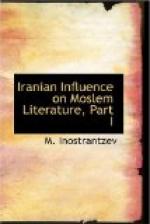[Sidenote: Meditation of despair.]
Perhaps the hour of my departure has already arrived before I could wring my hands. My deeds were once still such that I could hope they were meritorious. Now perhaps the prolonged hesitation over my search and investigation would turn me away from the good deeds which I practised formerly, so that my end would not be such as I strove for, and owing to my wavering and vacillation the fate of the man in the following anecdote would overtake me.
[Sidenote: An anecdote: fatal hesitation.]
A certain man had a love affair with a married woman. She had made for him a subterraneous passage opening into the street and its entrance was constructed close by a water jar. This she did for fear lest her husband or some one else should surprise her. Now one day when her paramour was with her word was brought that the husband was standing at the door. The lover hastened to get behind the jar but it had been removed by some one so he came to the woman and said, “I went to the passage but the jar of which you spoke was not there.” To which the woman, said “You fool, what have you got to do with the jar? I mentioned it to point to you the way to the passage.” “I could not be sure, since the jar was not near the passage, you should not have spoken of it to me and misled me.” “Now save yourself, enough of your stupidity and hesitation.” “But how shall I go since you spoke to me of the jar and even now confuse me?” Thus he remained there till the master of the house came up and seized hold of and belaboured him, and handed him over to the authorities.
[Sidenote: Burzoe follows good principles common to all creeds.]
[Sidenote: The properties of righteousness.]
Since I was apprehensive of the risks of shilly-shallying I resolved not to expose myself to the danger and to confine myself entirely to such works as all men regard as benevolent and which are consonant with all the religions. I refrained, therefore, from assault, murder and robbery, and guarded myself against incontinence and my tongue from falsehood and all utterance calculated to harm any one, avoided the smallest deception, indecency of language, falsehood, calumny and ridicule and took pains that my heart wished ill of no one and that I did not disbelieve in resurrection and retribution and punishment in the next world. I turned away my mind from wickedness and adhered energetically to good, perceived that there is no better associate or friend than righteousness and that it is easy to acquire it with the help of God. I found that it has more tender solicitude for us than father and mother that it leads to good and gives true counsel like one friend to another, that use does not diminish but rather multiplies it, and that when employed it does not wear out, but is constantly renewed, and becomes more beautiful; that we need not fear that the authorities will snatch it from us, the enemy will rob or miscreants




